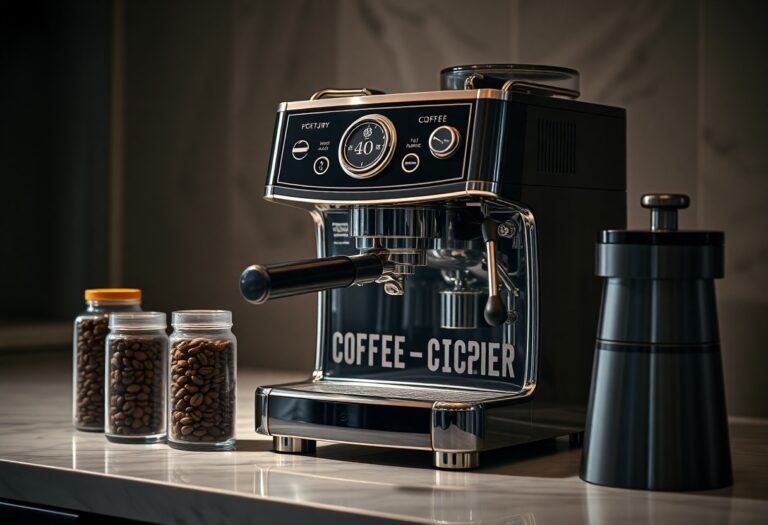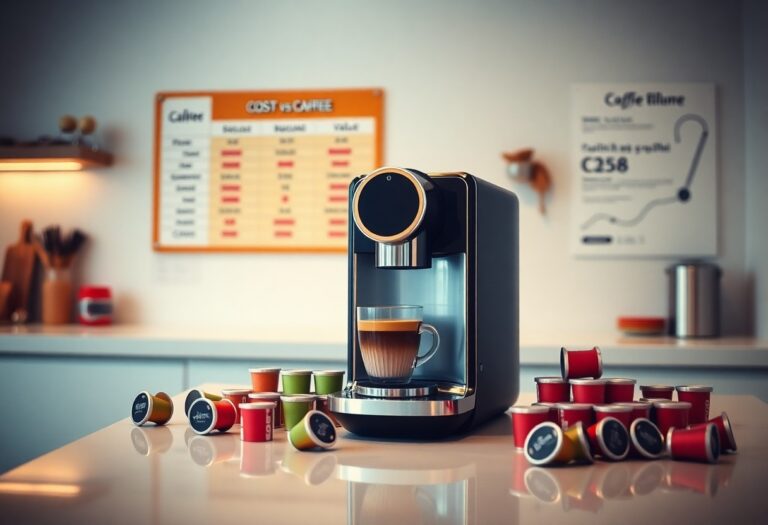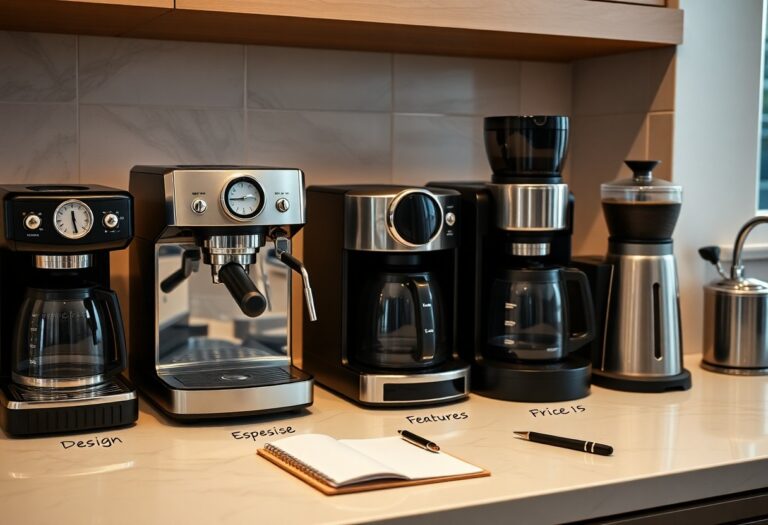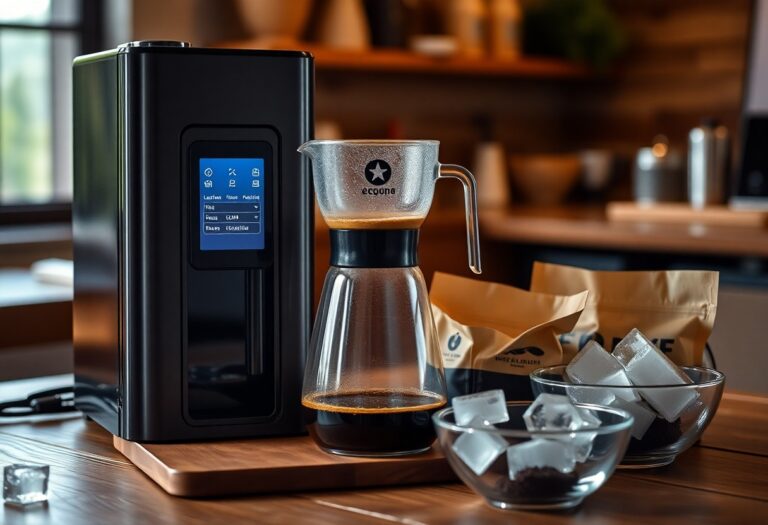What Can I Use to Clean My Coffee Machine – Cleaning Products
With the right cleaning products, you can ensure your coffee machine remains in optimal condition, enhancing the flavor of your brews. You might consider using vinegar or baking soda, both of which are effective natural cleaners that eliminate mineral buildup and odors. For a more thorough clean, specialized descaling solutions are available that target tougher residues and are specifically designed for coffee machines. Always avoid harsh chemicals like bleach that can harm your machine and compromise your health. By choosing the right products, you can enjoy better-tasting coffee and extend the lifespan of your machine.

Key Takeaways:
- Use descaling solutions specifically designed for coffee machines to remove mineral buildup and improve performance.
- White vinegar is a natural alternative that can effectively clean and descale, though it may require additional rinsing to eliminate residual odors.
- All-purpose cleaners should generally be avoided, as they may leave harmful residues that can affect the taste of your coffee.
- Regular cleaning of removable parts, such as filters and brew baskets, with mild detergent can prevent bacterial growth and enhance flavor.
- Always consult your coffee machine’s manufacturer guidelines for recommended cleaning products to ensure safe and effective maintenance.

The Science Behind Coffee Machine Contamination
Over time, remnants from your coffee brewing process can accumulate, ultimately compromising the quality of your brew. Rancid oils, mold, and mineral buildup are typical contenders lurking within your machine. The combination of heat and moisture creates an environment that fosters the growth of bacteria, making regular cleaning necessary to ensure your coffee remains delicious and safe.
Understanding Coffee Residue and Bacteria
Your coffee machine may seem innocuous, but the coffee residue left behind can become a breeding ground for bacteria. Oils from coffee beans deteriorate and mingle with water, creating sticky residues. These residues not only contribute to off-flavors in your brew but can also invite pathogens that thrive in warm, damp environments, potentially affecting your health and the flavor profile of your coffee.
The Impact of Hard Water on Machine Health
Using hard water in your coffee machine can significantly impact its longevity and performance. Hard water contains high levels of minerals like calcium and magnesium, which accumulate as scale in your machine over time. This buildup not only affects heating efficiency but can also result in costly repairs or replacements if left unaddressed.
Scale accumulation can drastically reduce the performance of your coffee machine, leading to longer brewing times and inconsistent temperatures. For instance, a significant decrease in the heating element’s efficiency may require more energy, causing higher utility bills and further stress on the appliance. Regular descaling with proper cleaning solutions designed to combat hard water buildup will prevent these issues and extend the life of your coffee maker, ensuring you get the best tasting cup every time.
Essential Cleaning Agents: What’s Safe and Effective
Choosing the right cleaning agents is key to maintaining your coffee machine without compromising its integrity. Safe options include natural ingredients like vinegar and baking soda, which effectively remove scale and residue. On the other hand, commercial cleaners tailored specifically for coffee machines can also ensure optimal performance by targeting stubborn buildup. Always check the product’s compatibility with your machine to avoid damage while achieving a thorough clean.
Natural Ingredients: Vinegar, Baking Soda, and Beyond
Natural ingredients like vinegar and baking soda have long been favorite choices for cleaning coffee machines. For vinegar, its acidic properties dissolve mineral deposits and eliminate odors, making it an excellent descaling agent. Baking soda works effectively for scrubbing away stains and neutralizing smells. Many enthusiasts also suggest using citric acid as a safe alternative, known for its excellent cleaning capabilities without the harshness of chemical substances.
Commercial Cleaners: What to Look For
When selecting a commercial cleaner for your coffee machine, focus on products specifically designed for brewing equipment. Look for those that are non-toxic and biodegradable to minimize environmental impact. Additionally, ensure they are free from harsh chemicals that could damage your machine. Brands that include clear instructions and recommendations for your specific model are often more reliable.
Pay attention to the ingredients listed on commercial cleaners to ensure they are effective yet safe. Products containing phosphoric acid or citric acid are generally effective descalers. Avoid cleaners with strong fragrances or bleach, as these can leave residues that affect the taste of your coffee. Reading reviews or seeking recommendations can also lead you to trusted options that deliver results without risking your coffee machine’s longevity.
Cleaning Methods for Different Coffee Machines
Different coffee machines require tailored cleaning approaches to maintain their efficiency and flavor quality. Familiarizing yourself with the optimal methods ensures a seamless cleaning process, helping you preserve the lifespan of your device while enjoying delicious brews. Each machine type has its own cleaning requirements based on its design and the coffee it produces.
Drip Coffee Makers: Step-by-Step Guide
| Step | Action |
|---|---|
| 1 | Unplug the coffee maker and empty the carafe. |
| 2 | Fill the water reservoir with equal parts water and white vinegar. |
| 3 | Run a brewing cycle. |
| 4 | Once finished, let it sit for 15 minutes. |
| 5 | Run 2-3 cycles with clean water to remove any residue. |
Espresso Machines: Specialized Techniques
Espresso machines require more in-depth cleaning due to their complex components. You should backflush your machine regularly if it’s equipped with a three-way valve. This involves using a blind filter basket that helps remove coffee oils and grounds from the brewing group. Additionally, cleaning the steam wand is imperative; use a damp cloth immediately after each use and purge it before and after frothing milk to prevent any residue from altering the flavor of your espresso.
For optimal performance, you should also descale your espresso machine every 1-3 months, depending on water hardness. Using a descaling solution designed specifically for your machine ensures thorough cleaning without damage. Regular maintenance of espresso machines not only guarantees exceptional coffee quality but also extends the life of this integral appliance, supporting better extraction and flavor profiles from your beans.
The Role of Routine Maintenance
Routine maintenance is vital for the longevity and performance of your coffee machine. Regular cleaning not only preserves the flavor of your coffee but also prevents the buildup of mineral deposits and oils that can lead to malfunction. Integrating high-quality products, like Coffee Maker Cleaner Tablets, into your cleaning regimen ensures a deep clean, enhancing both taste and efficiency.
Establishing a Cleaning Schedule
Set a regular cleaning schedule tailored to your coffee consumption habits. For daily users, weekly cleaning is recommended, while light users can extend this to once every couple of weeks. Consistency ensures that residues do not accumulate, preserving the integrity of your machine and the quality of your brew.
Tips for Prolonging the Life of Your Coffee Machine
To maximize the lifespan of your coffee machine, implement simple habits like descaling regularly, using filtered water to reduce mineral buildup, and keeping moving parts well-lubricated. These practices significantly minimize potential wear and tear. Elevate your care routine by avoiding harsh chemicals that can corrode components, helping maintain optimal functionality.
- Descale regularly
- Use filtered water
- Avoid harsh chemicals
- Inspect seals and components
Any of these strategies can be integrated into your routine easily.
Your coffee machine is an investment, and taking proactive steps ensures you enjoy quality brews for years to come. Implement a few more practices, such as wiping down the exterior after use and never leaving water in the reservoir for long periods. These small adjustments can drastically impact the maintenance of your machine.
- Wipe down after each use
- Avoid leaving water in the reservoir
- Store machine properly when not in use
Any effort you put into these measures will pay off in the long run.
Common Cleaning Mistakes and How to Avoid Them
Many coffee enthusiasts unknowingly make cleaning mistakes that can compromise their machine’s efficiency. One common error is neglecting to follow the manufacturer’s guidelines or using excessive amounts of cleaning agent, leading to residue buildup. Additionally, overlooking areas like the brew head and water reservoir can host bacteria and mold, negatively impacting your coffee’s flavor. To enhance your routine, take the time to read your machine’s manual and establish a consistent cleaning schedule that targets all necessary components.
The Risks of Over-Cleaning
Over-cleaning your coffee machine can lead to significant damage. Using harsh chemicals or excessive cleaning can deteriorate seals and gaskets, ultimately shortening the lifespan of your equipment. Moreover, constant disassembly for cleaning can result in misalignment or improper reassembly, affecting performance. Striking a balance in your cleaning approach ensures your machine stays in top condition while avoiding unintentional harm.
Misusing Ingredients: What Not to Do
Using the wrong ingredients during cleaning can backfire, resulting in poor performance or even damage. For example, you should never substitute vinegar for descaling solutions not intended for your machine type, as it can corrode internal components. Similarly, using dish soap on the brewing parts can leave a lingering taste in your coffee. Stick to manufacturer-recommended products to avoid these pitfalls and ensure your machine remains functional and safe.
Misusing cleaning ingredients can lead to various negative outcomes. For instance, vinegar, while often touted as a natural cleaner, may not be suitable for all espresso machines due to its acidity, which can erode gaskets over time. Similarly, household cleaners that contain bleach can contaminate your coffee, posing health risks. Always verify that the products you select are compatible with your machine’s materials and recommended for the specific cleaning tasks at hand. Educating yourself on proper cleaning solutions can ensure your coffee tastes great and your machine operates smoothly.
Final Words
With this in mind, choosing the right cleaning products for your coffee machine is imperative for maintaining its performance and ensuring great-tasting coffee. You can use vinegar or baking soda for a natural approach or opt for specialized coffee machine cleaners available in stores. Regularly descaling and cleaning components like filters and reservoirs will enhance the longevity of your machine. By selecting the appropriate cleaning solution and establishing a routine, you can keep your coffee machine in optimal condition, delivering delicious coffee for years to come.
FAQ
Q: Why is it important to clean my coffee machine regularly?
A: Cleaning your coffee machine regularly helps to maintain its performance and extend its lifespan. It also ensures that the flavors of your coffee remain consistent, as leftover oils and residues can affect the taste. Bacteria and mold can grow in dirty machines, potentially impacting your health. Regular cleaning keeps your coffee tasting fresh and your machine running smoothly.
Q: What types of cleaning products are safe for my coffee machine?
A: There are several cleaning products that are safe for most coffee machines. Mild dish soap mixed with warm water is effective for general cleaning. Coffee machine cleaning tablets, designed specifically for this purpose, are also a popular choice. Vinegar is a natural cleaning agent that can help to descale your machine, though it should be used cautiously to avoid potential damage to some components.
Q: Can I use bleach or harsh chemicals to clean my coffee machine?
A: It is not recommended to use bleach or harsh chemicals to clean your coffee machine. These substances can leave harmful residues that may affect the taste of your coffee and could potentially damage the machine. Stick to gentle cleaning agents and products specifically designed for coffee maker maintenance to avoid any negative impacts on your equipment.
Q: How often should I clean my coffee machine?
A: The frequency of cleaning your coffee machine depends on how often you use it. For regular users, a thorough cleaning once a month is recommended. Descaling every three to six months is also advisable, especially if you have hard water, as mineral buildup can affect the machine’s performance. Always follow the manufacturer’s instructions for cleaning intervals and methods.
Q: What is the best way to descale my coffee machine?
A: The best way to descale your coffee machine is to use a dedicated descaling solution or a mixture of equal parts white vinegar and water. Fill the water reservoir with the solution and run a brew cycle without any coffee. Afterward, repeat the process with plain water to rinse out any remaining solution. It’s necessary to consult your coffee machine’s manual for specific descaling instructions as different machines may have unique requirements.







